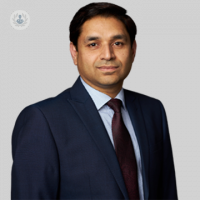Mitral valve and mitral valve surgery: an exploration
Written in association with:The mitral valve is a heart valve that regulates blood flow between the left atrium and ventricle. Surgery may be necessary if the valve becomes diseased, causing leakage or obstruction. This can lead to symptoms like shortness of breath and fatigue. Surgery aims to repair or replace the valve to restore proper heart function.
Distinguished consultant cardiac surgeon Mr Vivek Srivastava explores how the mitral valve works, explains the effect of a malfunctioning mitral valve and what mitral valve surgery involves.

What is the mitral valve?
The heart operates with four valves, facilitating blood flow in one direction while preventing reverse flow. This is the same function as valves used in plumbing. Among these, the mitral valve, situated on the left side of the heart between the lungs and the heart itself, plays a crucial role. Positioned between the chamber receiving oxygenated blood from the lungs and the heart's primary pumping chamber, its function is to ensure unobstructed blood flow from the lungs to the pumping chamber when open and to prevent blood from regressing towards the lungs when closed.
What can go wrong with the mitral valve?
Generally, the mitral valve comprises two flaps, and tends to function effectively throughout an individual's lifetime. However, certain individuals may encounter issues with their mitral valve for reasons that we do not fully understand. Among the most prevalent causes in developed nations is wear and tear associated with ageing, referred to as degenerative changes. This deterioration can result in blood leaking back through the valve towards the lungs.
Over time, calcium and scar tissue can build up on the heart valve. This makes the valve flaps stiffer and less flexible, which can block the valve from opening and closing properly.
How does a faulty mitral valve matter?
If the mitral valve malfunctions, either by leaking or becoming obstructed, it can impair heart function, potentially impacting the lungs and leading to symptoms that affect exercise tolerance and overall quality of life. In advanced cases, it may also affect other aspects, such as the right-sided tricuspid valve or cause rhythm disturbances. Failure to address these issues promptly may result in complications that can significantly impact life expectancy.
What are the treatment options for a diseased mitral valve?
During routine exams, an abnormal heart valve may be discovered without being initially concerning. Not all abnormal valves require immediate treatment, as the heart can initially compensate effectively, leaving individuals symptom-free. Regular checkups are recommended to monitor the condition's progression. In some cases, medications can help the heart cope with a malfunctioning mitral valve.
However, if the valve leakage or obstruction becomes severe enough to cause symptoms or impair heart function, more serious interventions are needed to avoid further complications. Historically, surgery has been the primary treatment option.
What does mitral valve surgery involve?
The best way to treat problems with the mitral valve depends on the type of problem. In some cases, it's possible to repair the valve. In other cases, where the damage is too severe, it may be necessary to replace the valve with an artificial one.
Which treatment option is better?
Repair is generally favoured due to several benefits associated with retaining one's own valve, over living with an artificial one. However, repair procedures can be technically intricate, prompting surgeons aiming to specialise in mitral valve surgery to undergo special training in this area.
Typically, a surgeon can provide an estimated likelihood of successfully repairing a mitral valve. In instances where replacement becomes necessary, various options are available for consideration. A cardiac surgeon can offer a more comprehensive discussion on this topic.
Are there other options for treating mitral valve problems?
Yes, there are some cardiology procedures which serve as alternatives to surgery. For example, a balloon may be employed to expand a narrowed valve, and newer options have emerged for addressing leaky valves. Nonetheless, it is essential to recognise that these alternatives may not be suitable for every patient or every valve condition, emphasising the importance of tailoring treatment to individual needs.
If you require mitral valve repair and would like to book a consultation with Mr Srivastava, you can do so by visiting his Top Doctors profile today.


